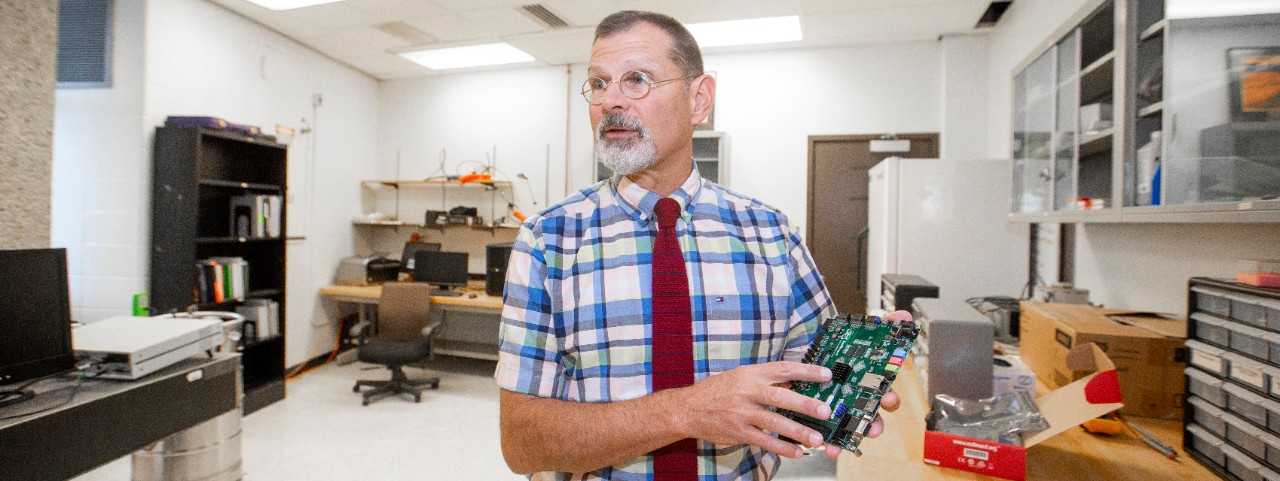
UC leads national cybersecurity initiative
Sponsored by the National Science Foundation, the new research center will help companies, consumers and the military protect electronics and networks from prying or tampering
The University of Cincinnati will lead a new National Science Foundation research center to examine ways to protect electronics and embedded systems from sabotage, hacking or spying.
UC’s new Center for Hardware and Embedded Systems Security and Trust will be the university’s latest industry-university cooperative research center. The center will work with the NSF, the U.S. Department of Defense and industry leaders to conduct research designed to thwart outside attack, UC engineering professor John “Marty” Emmert said.
“Building consumer trust in technology is central to our work,” said Emmert, who will serve as director of the new center and principal investigator of the project.
The project demonstrates UC's commitment to research as outlined in its strategic direction called Next Lives Here.
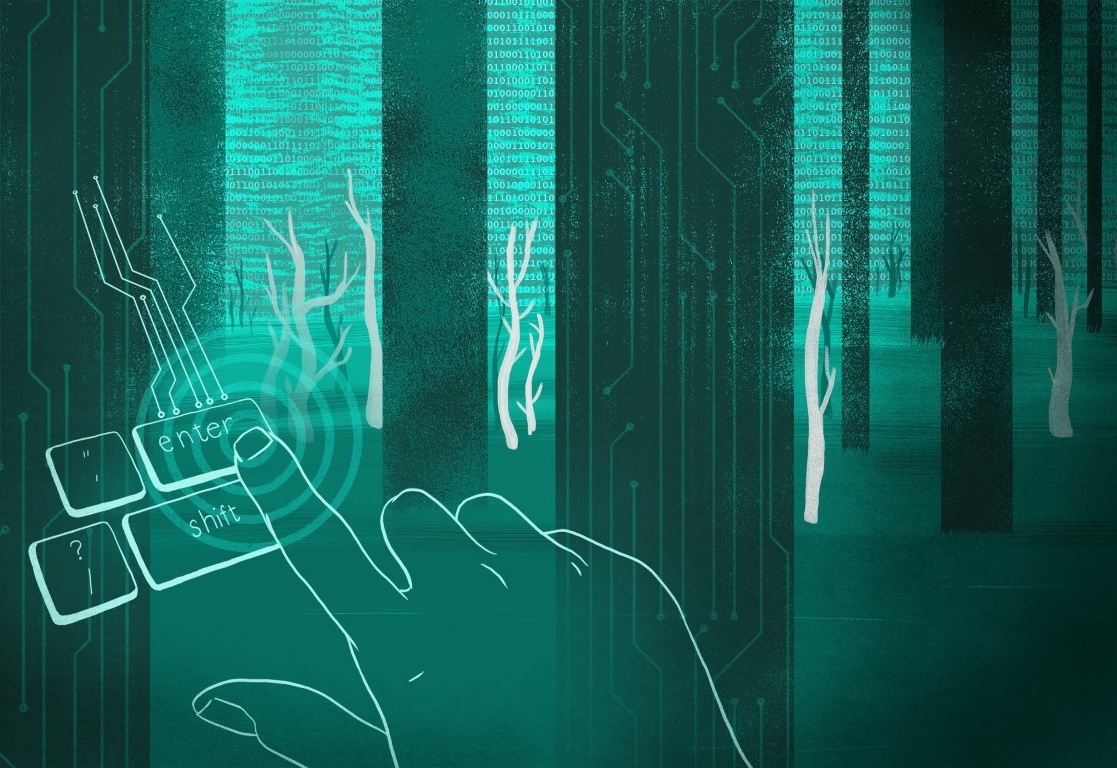
UC is leading a new nationwide effort to ensure the security of electronics for the government and industry. Graphic/Margaret Weiner/UC Creative Services
The NSF will fund the center with an initial $4.5 million grant for UC and its academic partners: the University of Virginia, the University of Connecticut, Northeastern University, the University of Texas at Dallas and the University of California, Davis.
The center will work with private companies, government agencies and nonprofits that will contribute annual membership fees of as much as $50,000 to investigate their unique vulnerabilities. So far, 26 industry and military members have signed up, including Verizon, Edaptive Computing, financial consultant Booz Allen Hamilton and engineering firm Wyle.
The research is very relevant now and of great interest to government and industry.
Marc Cahay, University of Cincinnati engineering professor
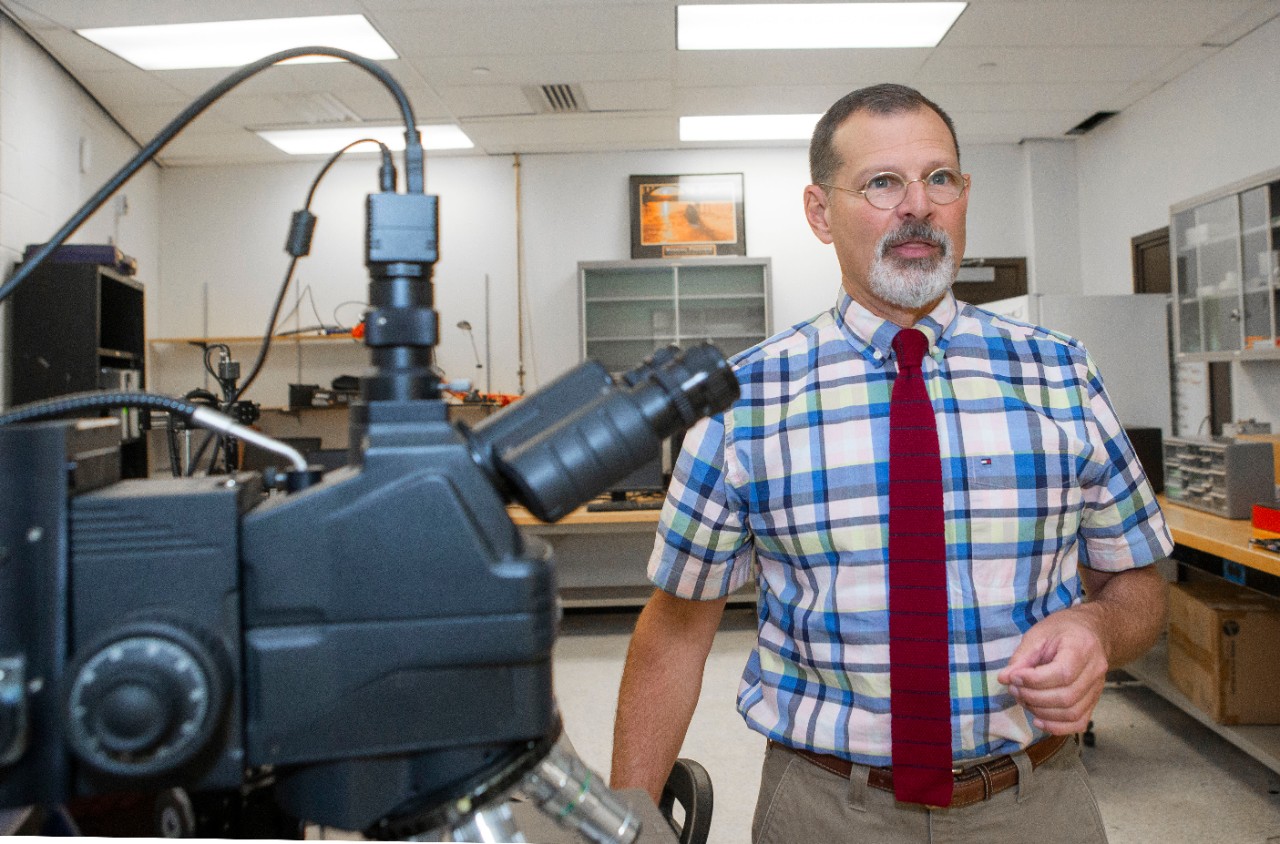
UC engineering professor John "Marty" Emmert is director of a new national research center sponsored by the National Science Foundation. UC will work with five other universities, industry, the military and government agencies to safeguard electronics and embedded systems. Photo/Joseph Fuqua II/UC Creative Services
The new center will have its own lab space in UC’s College of Engineering and Applied Science. In addition, Emmert said the center will be able to harness UC’s collective expertise across disciplines in collaboration with its other universities.
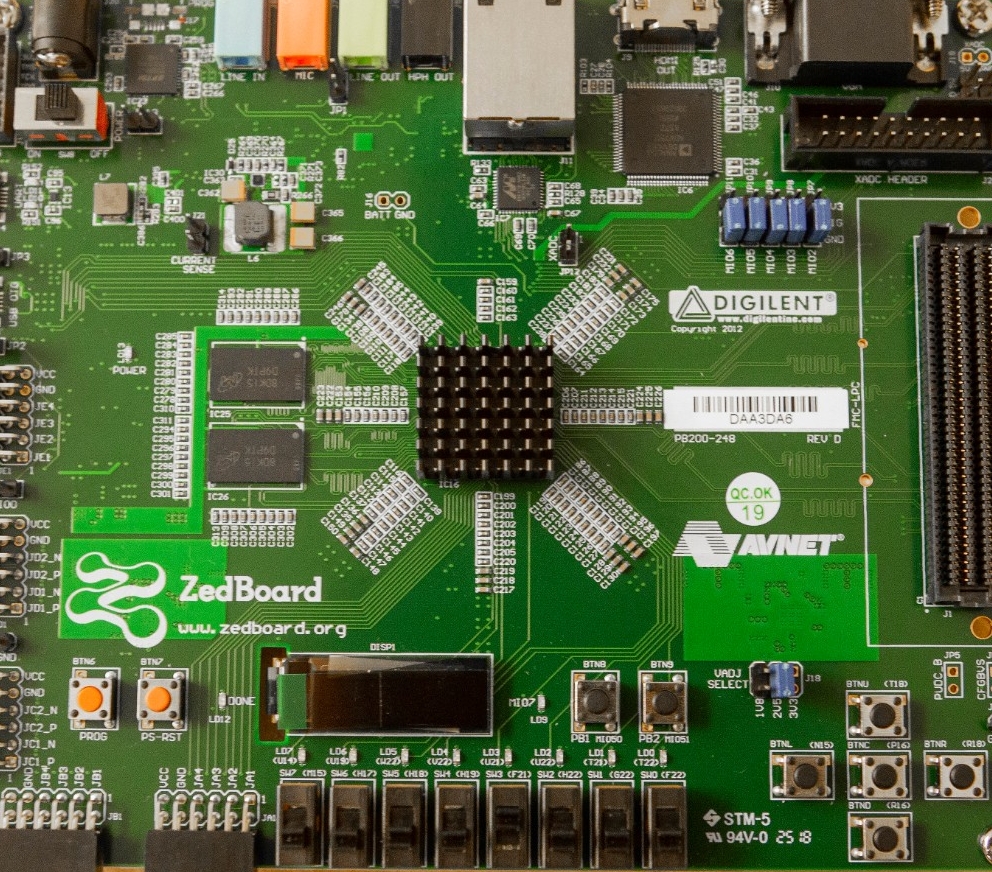
A circuit board. UC and five other universities will work with industry and the military to safeguard electronics from hacking, spying or sabotage. Photo/Joseph Fuqua II/UC Creative Services
Emmert said one pressing problem is finding a way to ensure the authenticity of computer chips. The use of counterfeit circuits could lead to catastrophic failures in aviation, communications or weapons systems.
“The issue most important to industry is information technology protection. Part of our mission will be to develop techniques to avoid circuit counterfeiting,” Emmert said.
UC professor Marc Cahay, head of UC’s Department of Electrical Engineering and Computer Science, said the center’s research focus is likely to attract widespread interest.
“The research is very relevant now and of great interest to government and industry,” Cahay said.
So far, at least 70 companies have expressed interest in participating and 26 of them have signed agreements.
“There are enormous challenges associated with the design, protection and resilience of electronic hardware and embedded systems,” said James Lambert, a University of Virginia professor who represents one of the center’s academic partners.
“Vulnerabilities to cyberattacks can be introduced during design, manufacturing or any stage of the product life cycle,” Lambert said. “By working with industry and government partners to understand what the real issues are and to ask the right questions, we are helping to address security, assurance and trust across all stages.”
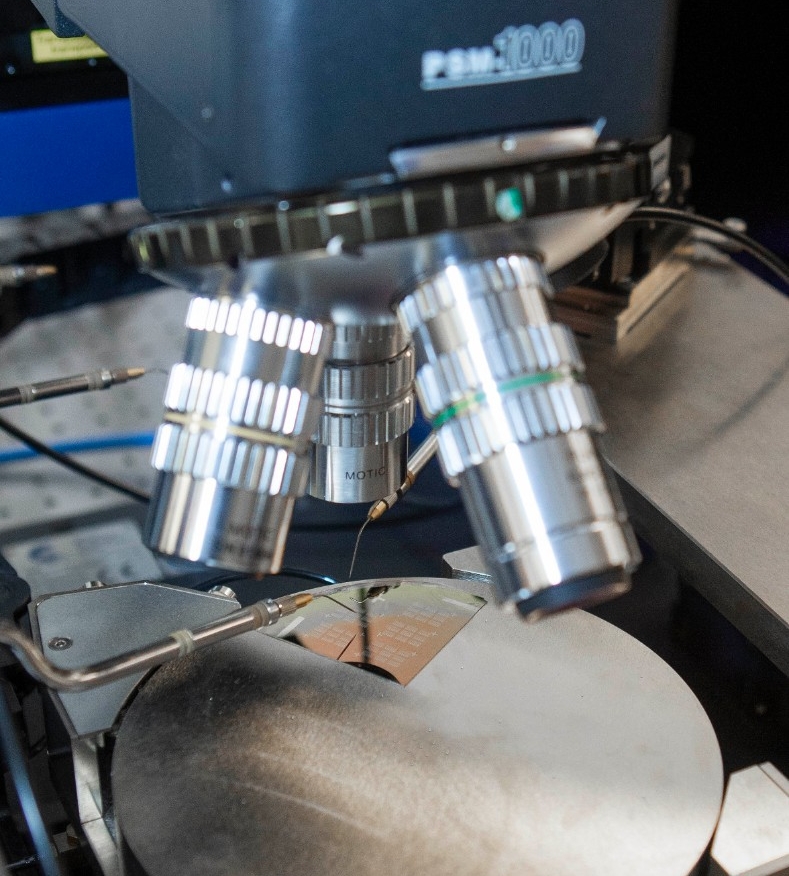
A microscope is trained on a microchip in a UC engineering lab. Photo/Joseph Fuqua II/UC Creative Services
UC has lead several other NSF-funded cooperative research centers, most recently with former UC professor Ian Papautsky who works in microfluidics and UC engineering professor and Ohio Eminent Scholar Jay Lee and his Center for Intelligent Maintenance Systems. The newly formed Center for Hardware and Embedded Systems Security and Trust will be the largest of all active NSF industry-university cooperative research centers.
Because of its close relationship to relevant industries, the center likely will help UC expand its student opportunities for co-ops, Emmert said. U.S. News & World Report ranks UC No. 1 in the nation for co-ops and internships among public universities and third overall. UC students collectively earned $75 million working for 1,300 international employers.
“We’re graduating students who will be well-versed in state-of-the-art technology. Ideally, students who graduate through our center will go on to fill much-needed positions in the workforce,” Emmert said.
Featured image at top: UC professor John Emmert holds a circuit board in a UC engineering lab. Photo/Joseph Fuqua II/UC Creative Services
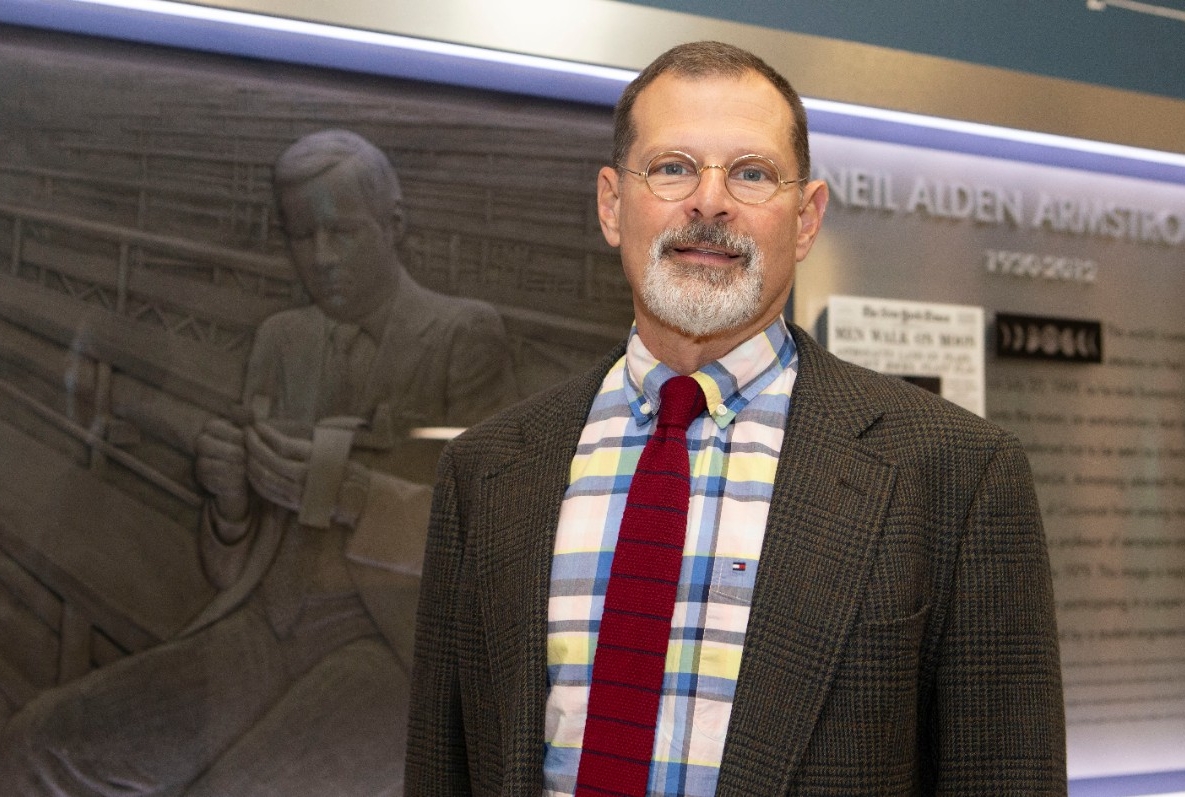
University of Cincinnati engineering professor John "Marty" Emmert is director of the new Center for Hardware and Embedded Systems Security and Trust. The research center is a collaboration of the National Science Foundation and six universities. Photo/Joseph Fuqua II/UC Creative Services
Next Lives Here
Discover UC's commitment to Next Lives Here, the strategic direction with designs on leading urban public universities into a new era of innovation and impact.
Become a Bearcat
- Apply online or get more information about undergraduate enrollment by calling 513-556-1100.
- Learn more about UC's many undergraduate and graduate programs.
Related Stories
Engineering professor gives students chance to explore physics with dance
February 23, 2026
University of Cincinnati students and high school students can explore physics concepts through dance during a weeklong summer experience at UC. Students from all backgrounds who are accepted into the program will spend a week working with both researchers and dancers at the Physics + Dance Lab, a summer day camp on August 3-7, 2026. Sarah Watzman, UC associate professor of mechanical engineering, is partnering with Black Box Dance Theatre for an educational component of her recent NSF CAREER Grant.
Discovery Amplified expands research, teaching support across A&S
February 19, 2026
The College of Arts & Sciences is investing in a bold new vision for research, teaching and creative activity through Discovery Amplified. This initiative was launched through the Dean’s Office in August 2024, and is expanding its role as a central hub for scholarly activity and research support within the Arts & Sciences (A&S) community. Designed to serve faculty, students, and staff, the initiative aims to strengthen research productivity, foster collaboration, and enhance teaching innovation. Discovery Amplified was created to help scholars define and pursue academic goals while increasing the reach and impact of A&S research and training programs locally and globally. The unit provides tailored guidance, connects collaborators, and supports strategic partnerships that promote innovation across disciplines.
Blood Cancer Healing Center realizes vision of comprehensive care
February 19, 2026
With the opening of research laboratories and the UC Osher Wellness Suite and Learning Kitchen, the University of Cincinnati Cancer Center’s Blood Cancer Healing Center has brought its full mission to life as a comprehensive blood cancer hub.
